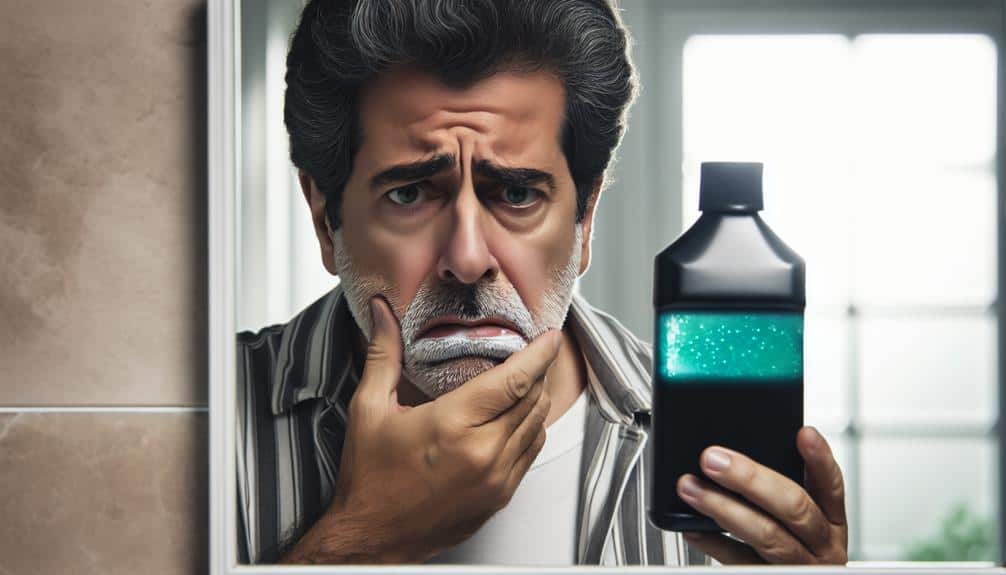Using peroxide for teeth whitening can harm your oral health. It can erode tooth enamel, leading to sensitivity and decay. The peroxide can also irritate your gums, causing discomfort. Additionally, there's a risk of chemical burns on your oral tissues if not used properly. Be cautious as accidental swallowing can have serious consequences. Learn more about how to safely whiten your teeth to protect your oral health.
Key Points
- Peroxide can erode enamel, leading to irreversible damage and increased sensitivity.
- Tooth sensitivity can result from peroxide irritating tooth nerves during whitening treatments.
- Improper application may cause gum irritation; use custom trays and minimal gel.
- High-concentration peroxide can cause chemical burns on oral tissues, leading to pain and ulceration.
- Accidental swallowing of peroxide can have serious consequences; store products safely and seek immediate help if ingested.
Potential Harm to Tooth Enamel
When using peroxide for teeth whitening, it's important to be aware of the potential harm it can cause to tooth enamel. Peroxide, commonly found in teeth whitening products, can lead to tooth erosion and enamel damage if used improperly or excessively. Tooth erosion occurs when the outer layer of the tooth, the enamel, is worn away by acidic substances like peroxide. This can weaken the tooth structure, making it more prone to sensitivity, cavities, and other dental issues.
Enamel damage is a serious concern because once the enamel is lost, it can't regenerate. This can lead to increased tooth sensitivity, discoloration, and even decay. To prevent enamel damage, it's vital to follow the instructions provided with the whitening product carefully. Avoid using peroxide-based whitening products too frequently or leaving them on for longer than recommended. Consulting a dentist before starting any whitening treatment can also help assess the risks and benefits for your specific dental health needs. Remember, protecting your enamel is key to maintaining a healthy and bright smile.
Increased Tooth Sensitivity
Increased tooth sensitivity may be experienced as a fundamental side effect when using peroxide for teeth whitening treatments. This sensitivity occurs because peroxide can penetrate the enamel and irritate the nerves inside the teeth.
If you experience increased tooth sensitivity after using peroxide for whitening, there are ways to manage the discomfort. Over-the-counter desensitizing toothpaste can help alleviate the sensitivity. These toothpaste varieties contain compounds that block the nerve endings in the teeth, reducing the pain sensation. Additionally, avoiding very hot or very cold foods and drinks can also help minimize the discomfort.
If the sensitivity persists or becomes unbearable, it's advisable to consult with your dentist. They can provide professional advice on how to manage the sensitivity and may recommend alternative methods for teeth whitening that are less likely to cause discomfort. Alternative methods like professional teeth whitening treatments at the dentist's office or whitening strips with lower concentrations of peroxide can be effective in brightening your smile without causing excessive sensitivity. Remember, pain management and seeking professional guidance are essential in ensuring a comfortable teeth whitening experience.
Risk of Irritating Gums
To minimize the risk of irritating your gums when using peroxide for teeth whitening, maintaining proper application techniques is vital. When dealing with the delicate tissues of the gums, it's important to be cautious and attentive. Here are some tips to help you mitigate the chances of gum irritation:
- Use a custom-fit tray: Make sure that the whitening tray fits your teeth accurately to prevent the peroxide solution from coming into contact with your gums excessively.
- Apply a small amount of whitening gel: Avoid overloading the tray with whitening gel as it can easily seep onto your gums and cause irritation.
- Wipe off excess gel: After loading the tray with the whitening gel, use a clean tissue or cotton swab to remove any excess that might touch your gums.
- Follow recommended treatment times: Adhere strictly to the recommended duration for each whitening session to prevent prolonged exposure that could lead to gum sensitivity or irritation.
Chemical Burns on Oral Tissues
Proper application of peroxide for teeth whitening is vital to prevent chemical burns on oral tissues. When peroxide comes into contact with oral tissues for an extended period or in high concentrations, it can cause tissue damage, leading to oral discomfort. The delicate tissues in your mouth, including your gums, cheeks, and tongue, are sensitive and can easily become irritated if exposed to concentrated peroxide solutions.
Chemical burns on oral tissues can result in pain, redness, and even ulceration. It's important to follow the recommended guidelines for using peroxide-based teeth whitening products to minimize the risk of these burns. Make sure that the solution is applied only to the teeth and avoid contact with the gums and other oral tissues. If accidental contact occurs, rinse your mouth thoroughly with water and consult a dental professional if you experience persistent oral discomfort or tissue damage.
Prioritizing proper application techniques can help prevent unwanted chemical burns and promote a safer teeth whitening experience.
Accidental Swallowing Concerns
To minimize the risk of accidental swallowing and its potential consequences, it's important to be mindful of how peroxide-based teeth whitening products are used. Accidental ingestion of these products can lead to serious issues, including emergency room visits and digestive system effects. Here are some key points to keep in mind:
- Always read the instructions: Following the recommended usage guidelines can help prevent unintended swallowing.
- Use the right amount: Avoid excessive amounts of the whitening product to decrease the risk of ingestion.
- Keep away from children: Store these products out of reach of children to prevent unintentional swallowing.
- Seek immediate help if swallowed: If accidentally consumed, contact a poison control center or seek medical help promptly.
Accidental ingestion of peroxide-based teeth whitening products can have severe consequences, leading to emergency room visits and adverse effects on the digestive system. Being cautious and following safety measures can prevent these risks and guarantee a safer teeth whitening experience.
Frequently Asked Questions
Can Peroxide-Based Teeth Whitening Products Cause Long-Term Damage to Tooth Enamel?
Using peroxide-based teeth whitening products can lead to enamel erosion and tooth sensitivity over time. It's essential to prioritize oral health and consider safer whitening alternatives to maintain the integrity of your teeth.
How Soon After Using Peroxide for Teeth Whitening Can One Expect an Increase in Tooth Sensitivity?
Curious about when sensitivity kicks in after peroxide whitening? Typically, it surfaces within a day or two post-treatment. Manage discomfort with desensitizing toothpaste or consulting your dentist for tailored pain relief strategies.
What Are the Signs of Gum Irritation From Using Peroxide for Teeth Whitening?
If you're experiencing gum irritation from peroxide teeth whitening, signs may include redness, swelling, or tenderness. To address this, consider alternative remedies like fluoride toothpaste or home remedies like a saltwater rinse for relief.
Is There a Risk of Developing Chemical Burns on the Oral Tissues From Using Peroxide for Teeth Whitening?
You must handle peroxide with care. Overuse can lead to chemical burns on your oral tissues, a scenario you definitely want to avoid. Remember safety precautions and consider alternatives to prevent such side effects.
What Should Someone Do if They Accidentally Swallow Peroxide While Using It for Teeth Whitening Purposes?
If you accidentally swallow peroxide during teeth whitening, seek emergency care immediately. Peroxide ingestion can be harmful, and medical attention is essential. Contact a healthcare provider or call poison control for guidance on next steps.




